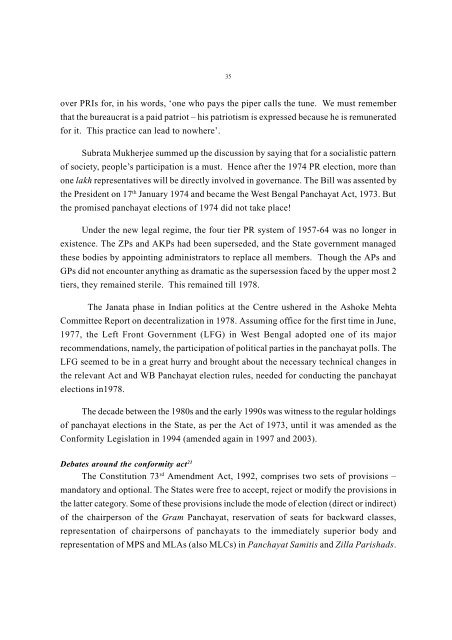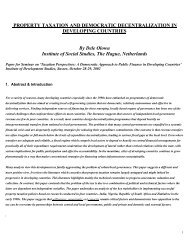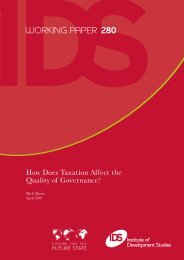View Article - Institute of Development Studies
View Article - Institute of Development Studies
View Article - Institute of Development Studies
Create successful ePaper yourself
Turn your PDF publications into a flip-book with our unique Google optimized e-Paper software.
35over PRIs for, in his words, ‘one who pays the piper calls the tune. We must rememberthat the bureaucrat is a paid patriot – his patriotism is expressed because he is remuneratedfor it. This practice can lead to nowhere’.Subrata Mukherjee summed up the discussion by saying that for a socialistic pattern<strong>of</strong> society, people’s participation is a must. Hence after the 1974 PR election, more thanone lakh representatives will be directly involved in governance. The Bill was assented bythe President on 17 th January 1974 and became the West Bengal Panchayat Act, 1973. Butthe promised panchayat elections <strong>of</strong> 1974 did not take place!Under the new legal regime, the four tier PR system <strong>of</strong> 1957-64 was no longer inexistence. The ZPs and AKPs had been superseded, and the State government managedthese bodies by appointing administrators to replace all members. Though the APs andGPs did not encounter anything as dramatic as the supersession faced by the upper most 2tiers, they remained sterile. This remained till 1978.The Janata phase in Indian politics at the Centre ushered in the Ashoke MehtaCommittee Report on decentralization in 1978. Assuming <strong>of</strong>fice for the first time in June,1977, the Left Front Government (LFG) in West Bengal adopted one <strong>of</strong> its majorrecommendations, namely, the participation <strong>of</strong> political parties in the panchayat polls. TheLFG seemed to be in a great hurry and brought about the necessary technical changes inthe relevant Act and WB Panchayat election rules, needed for conducting the panchayatelections in1978.The decade between the 1980s and the early 1990s was witness to the regular holdings<strong>of</strong> panchayat elections in the State, as per the Act <strong>of</strong> 1973, until it was amended as theConformity Legislation in 1994 (amended again in 1997 and 2003).Debates around the conformity act 21The Constitution 73 rd Amendment Act, 1992, comprises two sets <strong>of</strong> provisions –mandatory and optional. The States were free to accept, reject or modify the provisions inthe latter category. Some <strong>of</strong> these provisions include the mode <strong>of</strong> election (direct or indirect)<strong>of</strong> the chairperson <strong>of</strong> the Gram Panchayat, reservation <strong>of</strong> seats for backward classes,representation <strong>of</strong> chairpersons <strong>of</strong> panchayats to the immediately superior body andrepresentation <strong>of</strong> MPS and MLAs (also MLCs) in Panchayat Samitis and Zilla Parishads.





